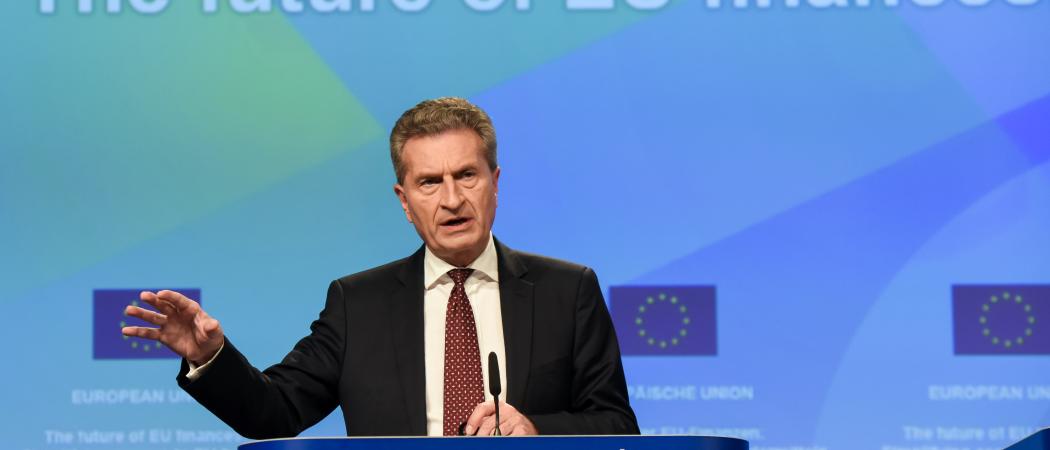Günther Oettinger says research should be the only programme spared spending cuts as the EU weighs how to make up for losing the UK’s €11B per annum contribution

Günther Oettinger speaking at the European Commission's headquarters in Brussels
Research should be the only EU programme spared spending cuts in the post-2020 budget period, EU Commission budget chief Günther Oettinger said on Tuesday, as Brussels looks for ways to cover the hole blown in its budget by the departure of the UK.
By the middle of next year, the Commission will publish a proposal for the EU’s trillion euro budget plans for the next financing period that begins in 2021.
“There is no guarantee that any programme will avoid cuts,” the Commissioner for budget and human resources said. “But if I had one option, it would be to avoid cuts to [research].”
Oettinger’s public support for maintaining R&D spending in Framework Programme 9 when it succeeds Horizon 2020, the current research programme, in 2021, is a boost to researchers who, like all benefactors of the EU budget, are scrambling to avert a big budget hit from Brexit.
The departure of the UK, the EU’s number two net contributor after Germany, in March 2019 will create a financing gap of around 16 percent of the EU’s overall budget, or €10 billion to €11 billion annually.
Big boost for Moedas
A campaign is already underway by EU Research Commissioner Carlos Moedas to protect, and ideally increase, the current Horizon 2020 research budget of €77 billion. He won some prominent allies last month when former World Trade Organisation head and former EU trade commissioner, Pascal Lamy, with 11 other research, industry and finance heads, called for the next EU budget cycle starting in 2021 to double spending on research and innovation.
As master of the purse strings, Oettinger’s support will carry significant weight inside the Commission. The Commissioner has previously made the case that research and innovation are critical for achieving economic growth in Europe.
Oettinger’s pronouncement may also signal the spending priorities of Germany, Europe’s largest economy and consequentially the dominant voice in EU budget discussions.
The Commission’s director general for research and innovation Robert-Jan Smits has previously identified Oettinger as a key ally for research. “With Commissioner Oettinger in charge, I cannot imagine we will see a decrease in our budget,” Smits told a Science|Business conference last month. “I’m convinced there will be an increase. Oettinger talks constantly about innovation and he comes from a region in Germany, Baden-Württemberg, that spends 5 per cent of [its] GDP on research."
Moedas would like to see a big rise in research and innovation spending, from about 8 per cent of the EU budget today.
For that to happen after Brexit, there would need to be cuts to other EU programmes, other net contributors including Germany, the Netherlands and Sweden would need to increase their contributions to Brussels, or the EU could pursue the politically thorny path of new sources of EU revenue such as common financial or environmental taxes.
EU research also finds itself in competition for funding from a new, dedicated fund for defence research. Smits has said previously that he expects defence research to attract significant funding. “If defence was not on the table, I think [research] could have grown to 20 per cent of the EU budget. Now, it will be very difficult to reach that.”
Hard choices
Ring-fencing research would mean cuts to other areas. EU regional support and agricultural funding, together recipients of 70 per cent of the EU budget, are beginning to look vulnerable.
“Hard choices will need to be made,” the Commission said in a June 28 budget reflection paper, which put forward options including cuts to EU farmers and local authorities.
Among the five scenarios outlined in the reflection paper on reforming the EU budget are a much lower to a significantly higher budget from 2020, under the headings of "carrying on", "doing less together", "those who want more, do more", "radical redesign" and "doing much more together".
Oettinger said he expects member states to support a mixture of “those who want more, do more", "radical redesign" and "doing much more together,” saying, “Carrying on is not so sexy.”
Investment funds may become more prominent in the future, said Oettinger. “But first we have to see if there are windfall profits from the Juncker Plan.” This fund aims to unlock billions of euros in private and public investment and use the money to spruce up digital, transport and energy grids. “For the moment the instrument is not useful for everyone,” Oettinger said.
British staff can stay
The Commissioner also said that British staff could remain on the EU payroll “for a decade or more” after the UK leaves.
Some of the 1,000 UK staff in Brussels institutions and agencies may have to accept lesser roles though, to avoid possible conflicts of interest. Already, some British officials have been moved out of Brexit-sensitive areas, such as financial services.
“To be a director in DG Trade and be British would be quite difficult,” said Oettinger. “But we have many posts and portfolios in which a Brit can work in the next decade for the EU.”
Another option is for British officials to look for new citizenship in Europe, be it registering with Belgium or another country. Many are already pursuing new citizenship.
“It’s a highly personal decision,” Oettinger said. “If there are problems to get the nationality, we have to give them some legal advice, no less, no more.”





 A unique international forum for public research organisations and companies to connect their external engagement with strategic interests around their R&D system.
A unique international forum for public research organisations and companies to connect their external engagement with strategic interests around their R&D system.